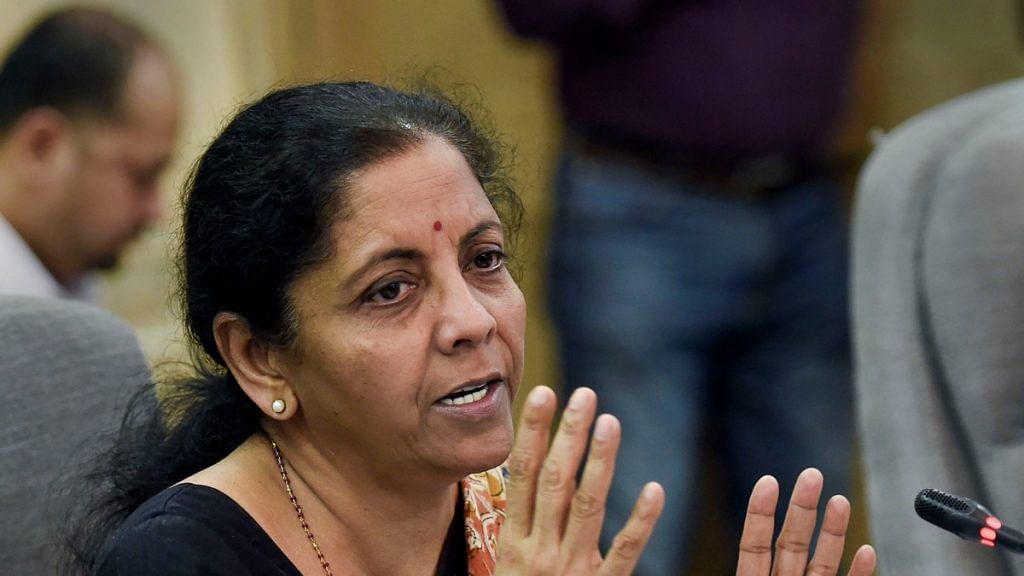In two weeks, Finance Minister Nirmala Sitharaman will present the Union budget. This budget needs to give a demand push to the economy, and an expansionary fiscal stance can help revive demand.
Prospects of a higher fiscal deficit create fears that Indian public debt may quickly become unsustainable. It is important that along with higher government borrowing, the FM makes a strong commitment to debt sustainability by setting up a Fiscal Council, a Public Debt Management Agency, and a deep and liquid bond market.
On top of the FM’s list should be measures that are necessary for reviving demand, investment and growth. However, her measures will have a positive effect if she also makes a strong commitment to debt sustainability.
Also read: 5.5% inflation is transitory, it shouldn’t prevent a fiscal boost in Budget 2020
Need for better estimates and transparency
The most important number that determines the entire budget is the expected nominal growth rate, which is the basis for tax projections. When the nominal growth rate is over-estimated, as it was last year, tax officials are given unrealistic targets. They then try to meet these targets through tax demands and raids, creating fear among investors and individuals. Both direct taxes such as income and corporate taxes and indirect taxes such as GST depend on the nominal GDP. There should be a realistic assessment of nominal GDP.
Second, the government must get the numbers right for what it spends. Often, payments that are due are not made during the year because the system of accounting followed by the government is based on cash paid out. Payments to private parties are delayed so that the government can show lower expenditure, and so, its borrowings are contained.
The debate about moving from a cash system to an accrual-based system of accounting has been long in the works. Some experts say that moving to a new system would take 10 years, and no finance minister has had the courage or motivation to do it. Sitharaman needs to make a beginning because she, more than any other finance minister in the recent past, has been accused of lack of data transparency. A commitment to better data transparency will give her greater credibility.
Third, the finance minister needs to clearly show what the government’s fiscal deficit is. This is critical, because reports like the one by the Comptroller and Auditor General have suggested that the deficit may be 2 per cent higher than the government said.
In addition, with the slowdown in GDP growth, India’s debt dynamics are now at the risk of being unsustainable. For debt sustainability, the rate of growth of debt must not be faster than the rate of growth of the economy. While debt grows at the interest rate, if the interest rate is higher than the growth rate of the economy, there is a risk of debt becoming unsustainable, of the debt-to-GDP ratio growing higher every year. Today, this is a real risk.
If Sitharaman wishes to undertake expansionary fiscal policy to give demand a push, she must do so in a transparent manner. Indeed, a higher deficit would be applauded by many because of the demand push it will give. A higher deficit when the economy is slowing is counter-cyclical fiscal policy.
Also read: Nirmala Sitharaman must get GDP estimate right in Budget 2020 — it should be about 5%
Three necessary steps
In addition to better data and greater transparency, the FM needs to make a strong commitment to debt sustainability. In the present institutional framework, this commitment is made through the Fiscal Responsibility and Budget Management Act of 2003. However, the FRBM can be amended in the Finance Bill, something has been repeatedly done. Commitment to fiscal prudence needs to be stronger.
First, the FM should announce a Fiscal Council, which would be an independent body that would examine the government’s revenue, expenditure and borrowing and make estimates of its borrowings. It should have a right to ask the government any question. It should be given autonomy so that its projections are credible. The Fiscal Council should make its reports public.
Second, the FM should announce steps to set up a genuine deep and liquid bond market. There is no greater commitment to fiscal prudence and debt sustainability than a well-functioning bond market that hits the government hard if it falters on its commitments to debt sustainability.
Setting up a bond market requires creating a Public Debt Management Agency and reforming regulation and market infrastructure of the bond market. The RBI, which is the banking regulator and monetary authority, should separate out the function of debt management. The Statutory Liquidity Requirement for banks should be removed. Norms that force the Employees’ Provident Fund Organisation and life insurance companies to buy government bonds should be changed, so that there is no captive market for government securities.
Monetary policy has been expansionary in the last few quarters. Now that headline inflation is higher, RBI may pause. At this time, fiscal policy needs to step in. The Union budget 2020-21 needs to focus on this task.
Also read: Modi govt’s major tool to save India from US-Iran conflict’s fallout – 2020 Budget
The author is an economist and a professor at the National Institute of Public Finance and Policy. Views are personal.
